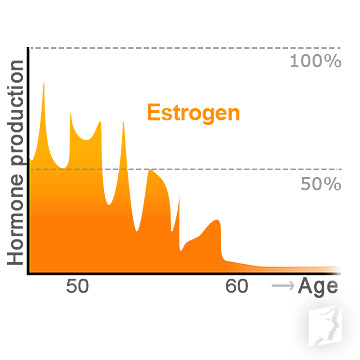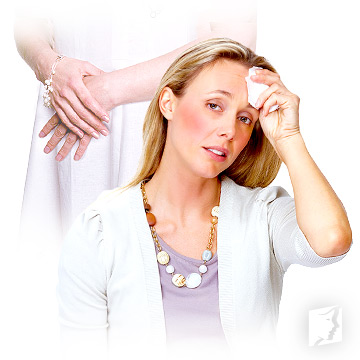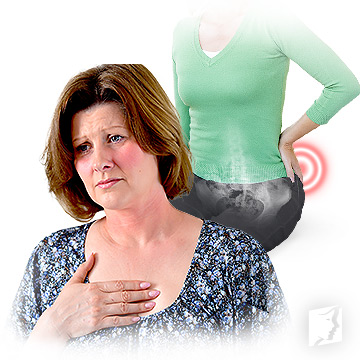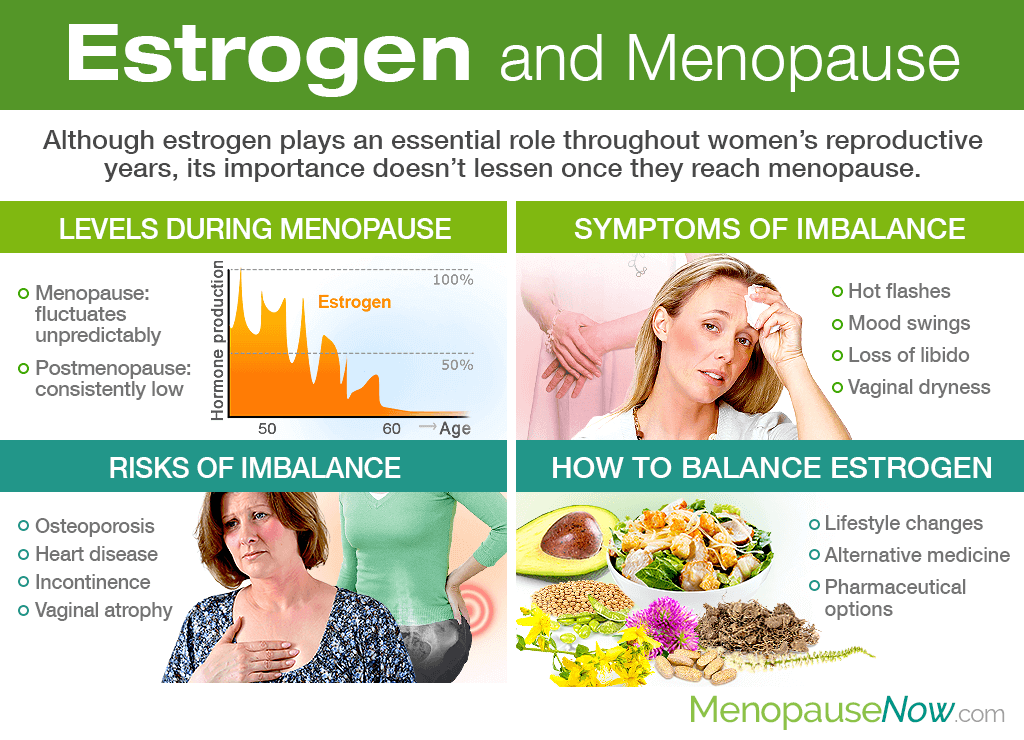Estrogen is one of two principal reproductive hormones whose levels can make women thrive or cause them a lot of strife, depending upon which end of the spectrum they are on. Continue reading to learn more about estrogen and menopause, including what happens to its production, what this means for women, and how to go about treating its imbalance in the body for optimal health.
What Happens to Estrogen during Menopause?

During women's reproductive lives, estrogen levels are relatively consistent, guiding the menstrual cycle on a monthly basis alongside the hormone progesterone. Estrogen is produced largely by the ovaries with smaller amounts being produced by other organs.
Then, as women enter the menopausal transition, the ovaries wind down reproductive functions, and estrogen levels fluctuate unpredictably until postmenopause, which is when the hormone generally reaches consistently low levels.
As a matter of fact, after perimenopause ends, postmenopausal estrogen levels can be at 10 percent of what they are during premenopausal years.
As such, this hormonal imbalance brought on by estrogen's fluctuations during perimenopause provokes various symptoms that are considered characteristic of this life transition.
Symptoms of an Estrogen Imbalance

The most common symptoms that can be brought on by an estrogen imbalance during menopause include:
- Hot flashes
- Night sweats
- Breast pain
- Mood swings
- Loss of libido
- Vaginal dryness
- Irritability
- Anxiety
- Difficulty concentrating
- And other menopause symptoms
Keep in mind that while it is extremely common for an estrogen deficiency to provoke these symptoms, many women suffer from estrogen excess during menopause as well. Having high levels of estrogen in the body provokes similar symptoms as those of low estrogen.
The surest way to diagnose an estrogen imbalance in the body - whether high or low - is to see your doctor for appropriate testing.
Risks of a Long-Term Estrogen Imbalance

Aside from troublesome symptoms, menopausal and postmenopausal women who suffer from an estrogen imbalance for a prolonged period of time are at a higher risk of developing more serious health complications, such as:
- Osteoporosis
- Heart disease
- Incontinence
- Vaginal atrophy
- Among others
How to Balance Estrogen during Menopause

Natural and effective menopause symptoms treatments start off with encouraging the implementation of less risky and invasive ways to promote hormonal balance in the body, which is through adjusting lifestyle behaviors.
Making lifestyle changes involves consuming an improved diet rich in essential macronutrients - lean protein, healthy fats, and complex carbs - and estrogen-boosting foods with phytoestrogens, plant-based estrogens; getting regular exercise for at least 150 minutes a week; and practicing wholesome habits for optimal endocrine system health, including quitting smoking and excessive alcohol and caffeine consumption.
Find increased effectiveness by pairing these methods with alternative medicines proven to encourage endocrine system health, including phytoestrogenic herbal supplements or hormone-regulating supplements.
Phytoestrogenic herbal supplements - including black cohosh, red clover, and St. John's wort - contain stronger concentrations of phytoestrogens than foods, thus filling the estrogen gap in the body more effectively. However, because they introduce external hormones into the body, they are not to be used long-term. Being under close supervision of a certified herbalist is also recommended.
On the other hand, hormone-regulating supplements, such as Macafem, work with the body to encourage natural hormone production by nourishing the endocrine glands. Because they do not contain hormones, yet work directly with your body, they are safer for long-term use and symptom relief.
Some women may feel as if their hormonal situation is drastic enough that it warrants the use of pharmaceutical initiatives, such as the use of estrogen replacement therapy.
In these instances, it is always best to consult with your doctor about appropriate measures to take not only for optimal hormonal health, but also peace of mind that what you choose is actually best.
Sources
- Breastcancer.org. (2016). Tests to Determine Menopausal Status. Retrieved June 18, 2019, from https://www.breastcancer.org/tips/menopausal/types/determine-status
- Healthy Women. (n.d.). Estrogen. Retrieved June 18, 2019, from https://www.healthywomen.org/condition/estrogen
- The North American Menopause Society. (n.d.). Changes in Hormone Levels. Retrieved June 18, 2019, from https://www.menopause.org/for-women/sexual-health-menopause-online/changes-at-midlife/changes-in-hormone-levels
- Women's Health Research Institute. (n.d.). How Hormone Depletion Affects You. Retrieved June 18, 2019, from https://menopause.northwestern.edu/content/how-hormone-depletion-affects-you

